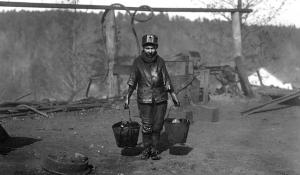
Women are more likely to be displaced in a climate disaster. Transgender people are more likely to be incarcerated. Communities of color are more likely to live in polluted neighborhoods.
Tragically, these statements are true today. But they don’t have to be the case in the future.
In a crisis of climate or capitalism, no one is safe. But some people are safer—the more privileges you hold in life, the better off you’ll be in a natural disaster, rising seas, or conflict. Women, people of other marginalized genders (think nonbinary, transgender, genderqueer, Two-Spirit, and other identities), and people of color face disproportionate hardships which accumulate on top of each other.
The LGBTQ+ or queer liberation movement has made incredible strides in the last 50 years, with advocates winning victories like equal marriage and repeal of don’t-ask-don’t-tell in the military. For each step forward, there are hundreds of tugs back. According to legislation tracking from the ACLU, in 2021 alone, 15 bills have been signed into law in six states to restrict LGBTQ+ rights. Dozens more have been introduced or are in committee discussions.
LGBTQ+ communities and individuals who present gender or sexuality in unconventional ways are under attack across the globe. Denmark, Romania, Poland, Turkey, and Hungary have all passed laws to stifle activism, teaching of gender theory, and people themselves, wrote Judith Butler, a queer philosopher and gender studies professor, for The Guardian.
The backlash against LGBTQ+ communities and individuals is all too similar to policies that have been used to restrict other communities—namely Black and brown people, Asian people, immigrants, Native Americans, and religious minorities from the beginning of American history through today. From Jim Crow laws to restricting voting rights in the South today, from the Chinese Exclusion Act of 1882 to the Muslim ban of 2017, from the Trail of Tears to Enbridge’s Line 3 pipeline through Native land in the north Midwest, even if harmful policies and actions are eventually reversed, they leave deep scars.
When coal is placed under enormous pressure, we get diamonds. When people are placed under pressure, we get resilience and creative solutions.
Through these pages we have the stories of leaders from around the country who face big challenges in their communities today and in the climate future. Yet they are pushing forward to create inclusive communities, meaningful protests, and powerful teachings that can be applied far beyond their locales.
We hope our Green American readers will be able to find insight for inclusion in whatever circles you move in, ideas for making your own communities more just, and hope for our future from these inspirational leaders.







